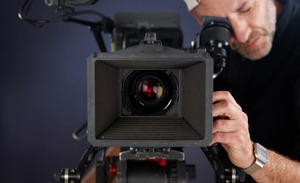Differentiating Between Real and Dramatized Medicine
Body
When it comes to storytelling in film and television, few elements are as frequently dramatized—or misunderstood—as medicine. High-stakes surgeries, adrenaline-pumping ER scenes, and emotional diagnoses often make for compelling viewing. But how accurate are these portrayals? The line between real and reel medicine is often blurred, and that's where a medical consultant becomes essential.
As a board-certified ENT physician and professional actor, Dr. Oppenheimer brings a unique dual expertise that helps productions get medicine right—without compromising on drama.
Common Myths in Medical Portrayals
Medical inaccuracies are more common than viewers realize. Some are harmless exaggerations meant to heighten tension. Others can be misleading—potentially spreading false ideas about real-life health emergencies, treatments, or even how doctors behave.
One persistent myth is the “flatline shock.” We’ve all seen it: a heart monitor flatlines, and a heroic doctor grabs the paddles to shock the patient back to life. In reality, defibrillators don’t work on flatlines. Shocking a flatline rhythm, or asystole, is ineffective and simply not done in real hospitals. Yet this scene is repeated over and over across various medical dramas and movies.
.
Another common trope involves the “lone genius doctor” diagnosing obscure diseases with barely any information, often without tests or collaboration. While it makes for great character development, it ignores the reality of modern medicine—a field built on teamwork, protocols, and evidence-based practice.
These myths aren't just technical inaccuracies; they affect how the public perceives healthcare. They can distort expectations, create unrealistic ideas about recovery times or treatments, and even influence how people respond in emergencies.
Correcting Misconceptions for the Audience
The role of a medical consultant isn’t just to nitpick scripts or correct jargon—it’s to help storytellers convey medical moments with clarity, authenticity, and integrity. Accuracy enhances the impact of a scene, builds trust with the audience, and adds credibility to the story.
For example, when actors know how to hold medical instruments correctly, or understand the emotional reality of delivering a diagnosis, their performances become more believable. When directors stage a realistic code blue or surgery scene, it immerses the viewer without pulling them out of the moment with glaring inaccuracies.
Medical consulting doesn’t mean dull or overly technical scenes, either. A good consultant knows how to strike the balance—preserving dramatic tension while grounding the action in real-world procedure. At FilmDr, this balance is part of the consulting ethos. The aim isn’t to drain the drama from a script—it’s to give the drama a more powerful foundation in truth.
Additionally, correcting misconceptions serves an educational purpose. Many viewers, consciously or not, use television and film as a reference point for how medicine works. Accurate portrayals can help dispel dangerous myths and empower viewers with better baseline knowledge—especially in emergencies.
FilmDr’s Role in Elevating the Standard
This is where FilmDr.com stands out. Founded by Dr. Randy Oppenheimer, FilmDr provides an unmatched perspective by combining deep medical knowledge with practical experience in acting and storytelling. Dr. Oppenheimer understands not just the science behind the scene, but also the rhythm, pacing, and emotional beats that make scenes work on screen.
With over 30 years in clinical practice, Dr. Oppenheimer has witnessed firsthand what real medicine looks and feels like—from operating rooms to patient consults. He brings this realism into the consulting process, working closely with writers, producers, and performers to elevate medical scenes beyond cliché.
At FilmDr, the consulting process can begin as early as script development. Dr. Oppenheimer offers feedback on medical accuracy, ensuring that terminology, diagnoses, and procedures are depicted correctly. During rehearsals, he can coach actors to deliver lines naturally, simulate physical symptoms authentically, and embody the demeanor of healthcare professionals.
On set, he serves as a real-time advisor—guiding blocking, medical choreography, and even helping prop departments get the tools and settings right. This holistic involvement ensures that the final product reflects a level of detail and truth that resonates with audiences and professionals alike.
Moreover, FilmDr adapts to each project’s needs. Whether it's a full-scale hospital drama, a courtroom scene involving medical testimony, or a character arc about illness and recovery, Dr. Oppenheimer tailors his consulting to suit the tone and scope of the production.
Conclusion: Realistic Portrayals Matter—Not Just for Accuracy, but for Audience Education and Safety
In a world where entertainment shapes perceptions, accuracy in medical storytelling isn't just a matter of pride—it’s a responsibility. Viewers rely on what they see to form ideas about health, illness, and the roles of medical professionals. When shows get it wrong, they can misinform. But when they get it right, the impact can be powerful and even life-changing.
Whether you're crafting a brief emergency room scene or building an entire medical drama, having a qualified medical consultant involved is not just helpful—it’s essential. It’s the difference between just making drama and making drama that feels real.








Comments